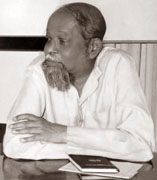|
DAILY NEWS ONLINE |
|
|
|
OTHER EDITIONS |
|
|
|
|
|
|
|
|
|
OTHER LINKS |
|
|
|
|
|
|
  |
In memoriam:
|
|
|
The first death anniversary of Regi Siriwardene, poet, political activist, scholar, critic, author, scriptwriter, artist and social activist falls on December 15
And that heart will no longer answer
My voice in rejoicing and grieving,
All's over... And into the empty night,
Where you are no more, my song will go on sounding.
- Regi Siriwardene
translating Anna Akhmatova
Exactly one year ago on the 15th of December 2004 Regi Siriwardene passed away after a long illness and Sri Lanka lost a brilliant son.
I first got to know Regi when I interned at the International Center for Ethnic Studies (ICES) in 1989. He was the editor of the 'Thatched Patio', the journal of the Center, and with his awesome reputation, it was always a source of wonder to me that he generously shared his time and knowledge with us lesser beings. A life long friendship was born from that time and I consider myself blessed for having known him.
Born May 15th 1922, Regi came from a family that epitomized the schizophrenia of a colonial heritage - where his westernized father spoke to him in English and made him read Macaulay and hero-worship Napoleon, and where his mother spoke only Sinhala. He was part of what was known as the "colonial" generation, equally at home with Shakespeare as with the poetry of Parakrama Kodituwakku.
This background could very well have influenced his inspiration of a nationalist cultural revival, yet he managed to avoid the danger of becoming either a nationalist or an ethnic chauvinist. In fact, he was a virulent opponent of ethnic chauvinism and majoritarianism for which he was often attacked and criticized in the press.
A product of the Peradeniya University under the auspices of Ludowyke, Passe and Doric de Souza, he was known as one of the most brilliant students to pass through that institution.
Regi Siriwardene who wore many hats, was what I would call a true Renaissance man. In his lifetime he was a journalist, writer, literary critic, editor, human rights activist, poet, linguist, scholar, scriptwriter, fabric designer, artist, political commentator, social activist, mentor and friend.
Above all, he was a prolific writer. No subject was spared. Regi is best known as a literary and artistic critic. His articles in the 'Ceylon Daily News' on books, film and theatre were a source of great knowledge for many SSC students at that time. Regi also wrote profusely on politics, literature, art, drama and even astronomy.
He wrote fiction, poetry and plays. He was a self taught linguist who was fluent in seven languages and his translations of Anna Akhmatova are acknowledged to be of an international standard. His political views were greatly influenced by the intellectual traditions of Marxism. He was anti-imperialist and greatly supported the poor and underprivileged.
When the 'Thatched Patio' which was the academic and literary journal of the International Center for Ethnic Studies underwent a name change it was Regi who suggested 'Nethra' and went onto describe it as a non-specialist journal for lively minds, His paragraph on submissions reveals his sense of humour and immensely practical approach:
'Nethra looks for material that is serious without being ponderous, readable and interesting without being superficial, and comprehensible even to readers who are not specialists in the intellectual field in which the subject is situated'.
How many academic journals can make this boast? When I took over the editorship of 'Nethra' in 2004 it was with much trepidation and a point of honour to do justice to the stewardship that was given to me.
Regi joined the ICES in 1984, one year after its inception, and soon he became an institution within the organization. Despite his reputation as one of the greatest literary critics Regi was one of the most accessible intellectuals that reigned. His familiar figure would wander down the hall ways of the ICES - a slight stooped form with his long sleeved shirt worn out, black trousers and sandals.
Instantly recognizable with his bald head except for a few strands of grey hair, his graing beard trimmed into a Lenin goatee and his glasses perched on nose hiding his eyes that would crinkle with amusement - he would visit his chosen favourites.
Sometimes he would wander into the administration room to regale Tharanga de Silva and myself with a little political titbit or a social insight. His sense of humour could be surprisingly juvenile and he could relate equally to the young as well as the old.
Over the years during my time at ICES he was a constant source of inspiration and support to many of us among whom were the Young Turks: Ruwanthie de Chickera, Neluka de Silva, Malathi de Alwis, Fara Haniffa, Ambika Satkunanathan, Jani de Silva, Sonali Deriniyagala and Darini Rajasingham-Senanayake.
Regi encouraged me to persevere as a writer when I showed him my scribblings and he proceeded to publish my stories in the Thatched Patio. He introduced me to jazz and Anna Akhmatova's poetry. Regi taught me that clothes do not make the man - he was the simplest of human beings, who it was rumoured did not own a suit or a pair of covered shoes.
He showed me that the truest human being is he who is most open to the world while coveting none of it. And so to Regi, I will say Tu duca, tu signore e tu meastro.
|
|

